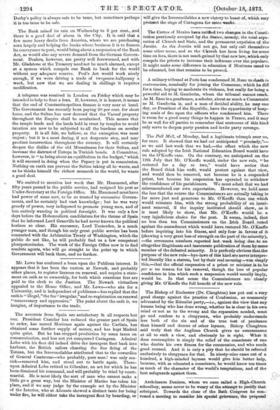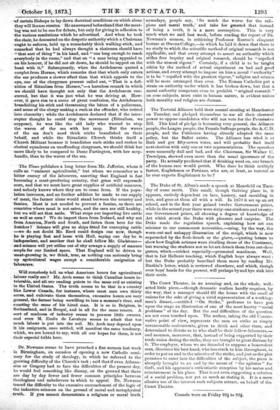Archdeacon Denison, whom we once called a High-Church schoolboy, seems
never to be weary of the attempt to justify that sobriquet. Towards the close of the Bath Congress he con- vened a meeting to consider his special grievance, the proposal 4of certain Bishops to lay down doctrinal conditions on which alone -they will license curates. He announced beforehand that the meet- ing was not to be one for debate, but only for giving in adhesion to -the various resolutions which he advertised. And when he took the chair, he descanted on the despotic authority which a Chairman ought to enforce, held up a remarkably thick walking-stick, and remarked that he had always thought a chairman should have "that sort of thing" in his hand, and "one long enough to reach everybody in the room," and that on "a man being appealed to on his honour, if he did not sit down, he should be tapped on the head with it." Subsequently, when the Archdeacon quoted a couplet from Horace, which remarks that that which only enters the ear produces a slower effect than that which appeals to the eye, one of the clergymen present called out, "That is a defi- nition of Ritualism from Horace,"—a harmless remark in which we should have thought not only that the Archdeacon con- curred, but that it was just what he was driving at. How- over, it gave rise to a scene of great confusion, the Archdeacon brandishing his stick and threatening the baton of a policeman, :and some of the clergy making a rash at the offender, who retired into obscurity ; while the Archdeacon declared that if the inter- zupter thought he could stop the movement (Ritualism, we suppose), he was like the old lady who wanted to stop -the waves of the sea with her mop. But the waves of the sea don't need thick sticks brandished on their
• behalf, and while the Ritualistic Church thinks itself a
• -Church Militant because it brandishes such sticks and rushes in .clerical squadrons on tmoffending clergymen, we should think her 'more likely to be compared to Dame Partington, with her mop- -handle, than to the waves of the sea.



































 Previous page
Previous page